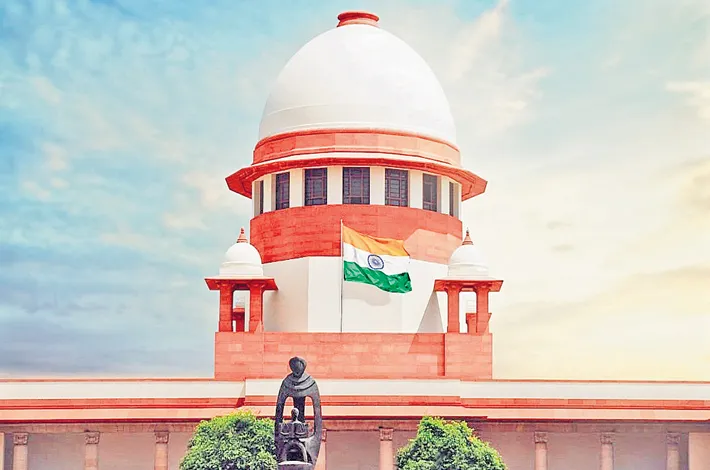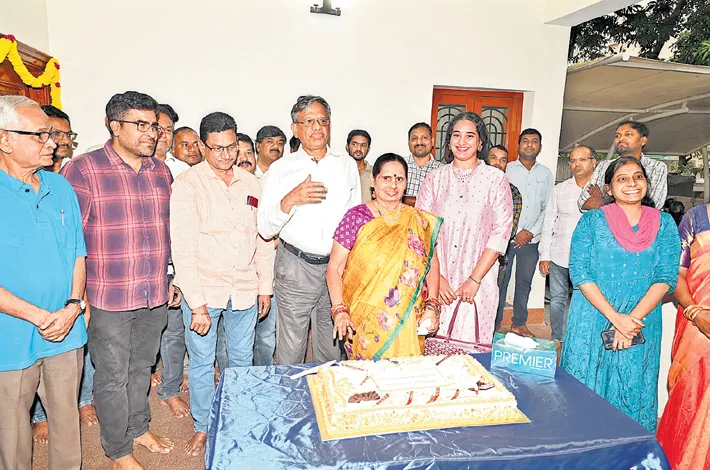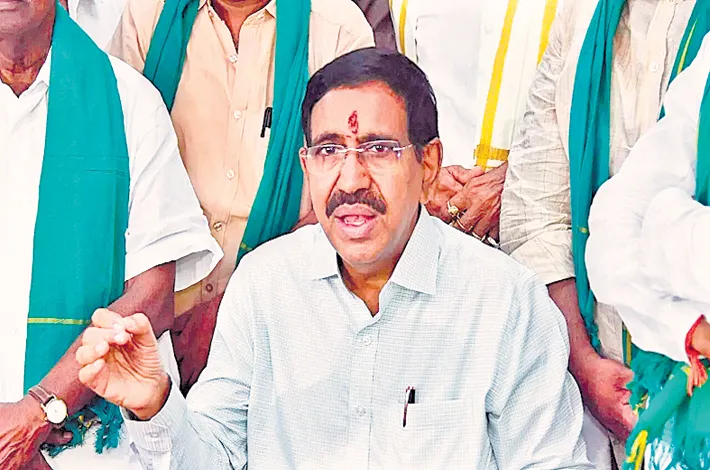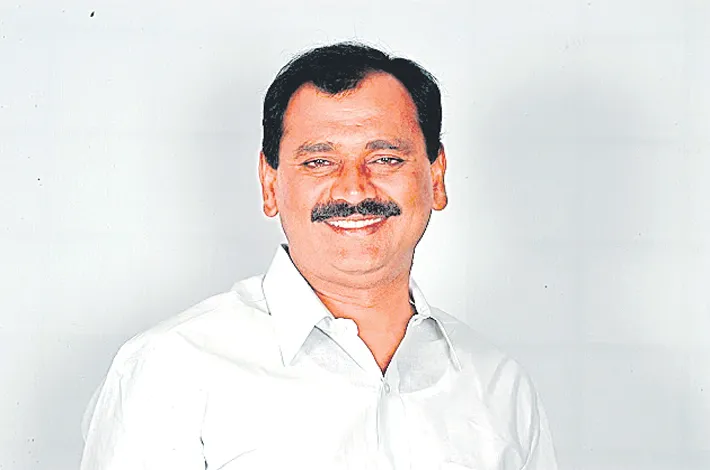SC tells TG to restore status quo
17-04-2025 12:00:00 AM

Asks TG not to justify its actions but come out with a plan to restore 100 acres
If you want Chief Secretary to be saved from severe action, you have to come out with a plan as to how you would restore those hundred acres...Otherwise we don't know how many of your officers will have to go in a temporary prison-Justice Gavai
* What was the compelling urgency to undertake the developmental activities including the removal of trees from the alleged forest area?
* Whether for such development activity, the State has obtained the Environmental Impact Assessment certification.
* Whether for felling the trees, requisite permissions from the forest authorities, or any other local statutes have been obtained or not?
* What is the necessity of having officers (specified in the order) in the committee constituted by the State of Telangana in as much as prima facie they have nothing to do with the identification of forests?
* What the State is doing with the felled trees?
metro india news I new delhi
In the matter pertaining to large-scale felling of trees in the Kancha Gachibowli area of Telangana, the Supreme Court today expressed that restoration of status quo at the site will be the Court's first priority and the Wildlife Warden of the State shall take immediate steps to protect wildlife affected by the deforestation.
A bench of Justices BR Gavai and AG Masih heard the matter and posted it to May 15, following a submission by the state of Telangana that the latest CEC report was voluminous and the state would need some time to file reply.
"Pursuant to our order, the CEC has inspected the spot and submitted report. Dr Singhvi, appearing on behalf of respondent-state, states that report is voluminous and State would take some time to respond. Four weeks' time is granted to the state to file its reply. In the meantime, we direct the Wildlife Warden of Telangana to examine and put into effect immediate steps that are required to be undertaken to protect the wildlife which has been affected on account of the deforestation in the 100 acres", noted the order.
The Court further made it clear that in the meantime, not even a single tree should be felled in the subject area. It also warned Telangana authorities about sending its officers to a "temporary prison" if the state chooses to oppose restoration.
At the outset of the hearing, Senior Advocate Dr Abhishek Manu Singhvi (for Telangana) informed that all development activities in the subject area have been stopped. He further contended that whatever perceived errors were there, the same were "bonafide and unintentional". In response to a specific query as to whether the state had permission of tree authorities before felling trees, the senior counsel replied, "yes, except a small number of trees". As per his contention, 1300-odd trees were exempted by self-certification in terms of the statute (WALTA Act/Rules).
Surprised, Justice Gavai questioned, "Even pursuant to our 1996 order (which laid down that 'forest' has to be understood in terms of its dictionary meaning)? Are they above the orders of the Supreme Court?" Highlighting the cases of the Union and Maharashtra governments, which fought long battles over felling of trees for important projects, the judge added that if there is any such certification in Telangana, it is in contravention of the Supreme Court's 1996 judgment in the present matter.
"We will not go by the interpretation of either the bureaucrats or the Ministers...let the State justify as to how it overcame the Court's 1996 order." So far as Singhvi urged that the Chief Secretary is only a coordinating authority, and the process in the subject area was going on since March, 2024, Justice Gavai noted that bulldozers were brought in to clear the trees only during the 3-day holiday period in March, 2025. "What was the tearing urgency?" the judge questioned.
Senior Advocate K Parmeswar (acting as Amicus Curiae), on the other hand, told the Court that the State of Telangana has adopted a self-certificate mode, where it itself certifies that certain species are exempted from the application of the Court's 1996 judgment and therefore no permission is required for their felling. Referring to the latest CEC report, he further alleged that the state authorities mortgaged land in the subject area to a private party for Rs.10000 crores right before bulldozers were brought in to raze the trees, but the affidavit of the State Chief Secretary is silent on these aspects.
The Amicus also conveyed an apprehension of the CEC (Centrally Empowered Committee) that pursuant to the mortgage, private parties may assert claims over the subject area. Hearing the submissions, the Court expressed that its concerns are limited to restoration of status quo on the 100 acres land, protection of the ecology, the presence of bulldozers at the site, and the razing of trees without requisite permission.
The judge further communicated to the state's counsels that rather than justifying the felling of trees, a better recourse would be to plan out restoration. On this, Singhvi conceded that he would be seeking instructions.
Subsequently, Senior Advocate S Niranjan Reddy (for an intervenor) drew the Court's attention to certain photographs, to highlight that wild animals in the area have been adversely affected due to the deforestation of 100 acres of land and are at risk of being hunted by stray/wild dogs. He asserted that there is a need for wildlife personnel to take steps to ensure cover and supply of water for the animals. In this regard, Justice Gavai remarked, "we are surprised to see those videos where those herbivorous animals are running to seek shelter, bitten by stray dogs!"
Eventually, the bench told Singhvi to see to it that steps are taken to protect the wildlife animals. "Let your wildlife warden tell us on next date what he is doing to protect them...let there be green lungs in the city, like we have in Chennai (Guindy National Park), Bombay (Sanjay Gandhi National Park) and Jaipur", said Justice Gavai.
Notably, the Court emphasized that its primary concern is protecting the environment and the damage done to it. Any enactment which falls foul with the language of the 1996 judgment of the Court will not be tolerated, it said. Further, in response to CEC's apprehension of private party asserting claim over the subject land in view of the mortgage, Justice Gavai remarked that the bench would go out of its way, if need be, to protect the environment. "Under Article 142 (of the Constitution), we can do anything. For protection of environment and ecology, we will go out of the way if needed", said the judge.
Earlier proceedings in the matter
On April 3, the Court had ordered the State of Telangana to stop all sorts of developmental activities in the area. "Until further orders, no activity of any sort, except the protection of trees already existing, shall be undertaken by the State," it had said. The bench had further warned, "In case any of the directions issued by us are not complied with in true letter and spirit, the Chief Secretary of the State shall be held personally liable".
Notably, the Court wondered as to what was the "alarming urgency" in cutting down the trees when the statutory exercise to identify the forest lands was yet to commence. It further referred to a report called from the High Court's Registrar (Judicial), which showed an "alarming picture" as a huge number of trees were fell, deploying huge machinery and JCBs to disturb the area of hundreds of acres.
The Court specially took note of pictures showing peacocks and deers fleeing from the region amidst destruction activities and concluded that they prima facie indicated existence of a forest inhabited by wild animals in the region. Ultimately, the Chief Secretary of the State was asked to file an affidavit answering the following specific queries:








